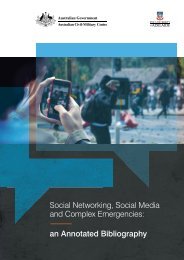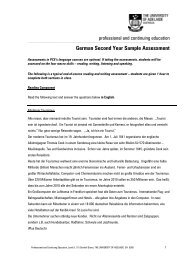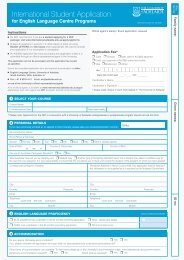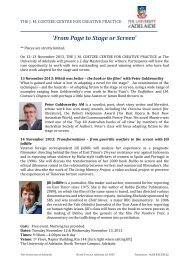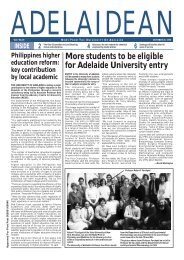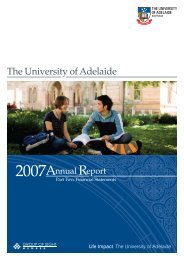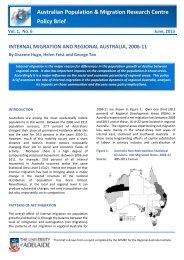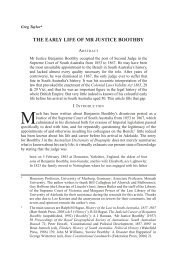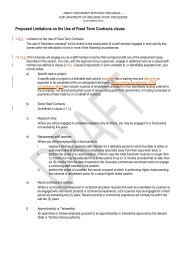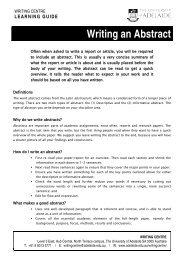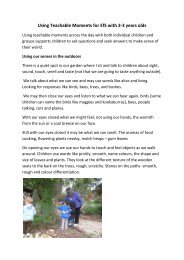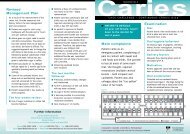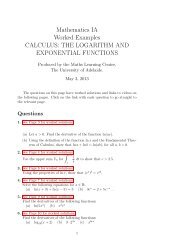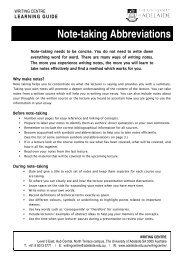Unbridling the Tongues of Women - The University of Adelaide
Unbridling the Tongues of Women - The University of Adelaide
Unbridling the Tongues of Women - The University of Adelaide
Create successful ePaper yourself
Turn your PDF publications into a flip-book with our unique Google optimized e-Paper software.
<strong>Unbridling</strong> <strong>the</strong> tongues <strong>of</strong> women<br />
same doctrine which, she said, had made her ‘shrink from bringing children into <strong>the</strong><br />
world with so little chance <strong>of</strong> salvation’, 5 also taught that <strong>the</strong> deity’s chosen could be<br />
known by <strong>the</strong>ir good works, and this undoubtedly fostered <strong>the</strong> ambitions she had<br />
formed even before she reached South Australia.<br />
<strong>The</strong> dark night <strong>of</strong> her soul lightened as she adapted to colonial life and began<br />
to feel more self-sufficient. <strong>The</strong> Spences had immigrated to a colony which held<br />
religious liberty as one <strong>of</strong> its founding principles. During <strong>the</strong> early years <strong>of</strong> settlement,<br />
as Douglas Pike observed in <strong>the</strong> study he entitled Paradise <strong>of</strong> Dissent, <strong>the</strong><br />
‘presence … <strong>of</strong> so many ministers and preachers and so varied a swarm <strong>of</strong> sects, most<br />
<strong>of</strong> <strong>the</strong>m with places <strong>of</strong> worship, created a record surpassing that <strong>of</strong> New England’s<br />
first decade’. 6 Debate over government funding for church or chapel building, for<br />
salaries for ministers, and for religious instruction in schools, resounded in <strong>the</strong> columns<br />
<strong>of</strong> <strong>the</strong> South Australian press during <strong>the</strong> 1840s and 1850s. 7 And <strong>the</strong> 1840s<br />
saw South Australian Presbyterians cautiously arguing <strong>the</strong> issues which in Scotland<br />
led <strong>the</strong> Free Church to break away from <strong>the</strong> Establishment. 8 Yet, despite sectarian<br />
squabbling, rival claimants for <strong>the</strong> colonists’ souls were <strong>of</strong>ten able to co-operate. <strong>The</strong><br />
Anglican minister could <strong>of</strong>fer his church to <strong>the</strong> Scottish Reverend Robert Haining<br />
for <strong>the</strong> colony’s first service for adherents to <strong>the</strong> Established Church <strong>of</strong> Scotland. 9 In<br />
such an environment, <strong>the</strong> teachings <strong>of</strong> any one faith could seem more a question <strong>of</strong><br />
individual choice than <strong>of</strong> divine truth. Spence began to doubt herself less and <strong>the</strong><br />
faith <strong>of</strong> her childhood more. In 1850, when she was 25, she told Haining that she<br />
would not take communion any longer because she was not ‘a converted Christian’.<br />
Her announcement surprised <strong>the</strong> minister less than her continued attendance at<br />
church after making it. She had probably not lost her faith completely, and she may<br />
have needed <strong>the</strong> social security <strong>of</strong> belonging to a congregation. But with her faith<br />
suspended, her ambition triumphed over her doubts <strong>of</strong> her worthiness. In August<br />
1854, John Taylor brought her £30 and <strong>the</strong> assurance that her first novel was to be<br />
published. 10<br />
Soon afterwards, at a ball, Caroline Emily Clark sought an introduction to Miss<br />
Spence because an uncle in England had written to her ‘that “Clara Morison”, <strong>the</strong><br />
new novel, was a capital story <strong>of</strong> South Australian life’. She was <strong>the</strong> first stranger to<br />
acknowledge Spence’s achievement; she won her lasting gratitude – for that, and for<br />
<strong>the</strong> community into which she introduced her. Spence admired Emily Clark and her<br />
literary bro<strong>the</strong>r, Howard, and warmed to <strong>the</strong>ir mo<strong>the</strong>r who was, she thought, like<br />
her own ‘in her sound judgment, accurate observations, and kind heart’. 11<br />
64



